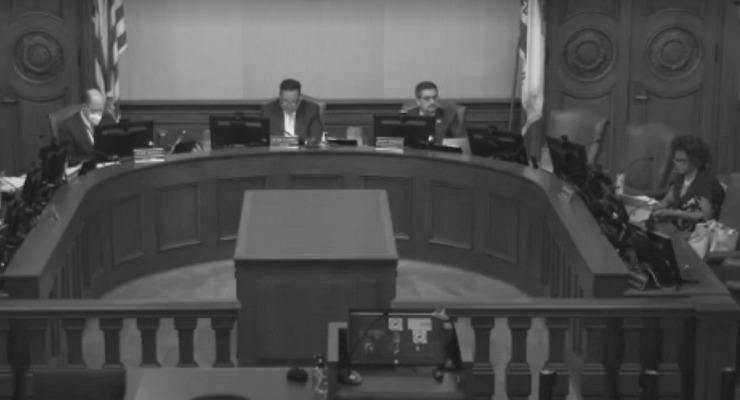
In the late spring of 1964, John Lewis was Chair of the Student Nonviolent Coordinating Committee (“SNCC”). He put out a call for young Northern men and women to go South for Freedom Summer – an ambitious plan to register Mississippi Blacks in a parallel Freedom Democratic Party and to challenge the credentials of the racist regular Mississippi Democratic Party at the 1964 Democratic National Committee. I was teaching speech classes at Loyola University (now Loyola-Marymount) and had no commitment for the summer, so I answered John Lewis’ call.
John Lewis’ call to put our bodies on the line
John Lewis and other Black SNCC workers had again and again been subjected to police and vigilante violence before Freedom Summer; John Lewis would later be beaten to near-death. SNCC correctly believed that the injection of young Northern White men and women into the freedom struggle would bring more national attention to the moral outrage of racism, racist violence, and racist repression. SNCC recognized that when the lives of the sons and daughters of hundreds of White youths from the North were at risk, the nation would pay more attention to the sins of racism than when it was Black lives that were being violated, thereby helping to advance the struggle for racial justice.
While we were getting training by SNCC in Oxford, Ohio, three civil rights workers in Mississippi were detained by the local police, released to vigilantes, brutally tortured, and murdered. We went to Mississippi with the recognition that we were putting our bodies on the line, but we went anyway. Our work registering Black Mississippians culminated in the turbulent 1964 Democratic convention at which Fannie Lou Hamer uttered her iconic words “I’m sick and tired of being sick and tired.” Over our objections, the Democratic party seated most of the racist regular Mississippi Democratic Party, but a token number of delegates from the Freedom Democratic Party were seated. The next year saw passage of the federal Voting Rights Act that ultimately led to the enfranchisement of Blacks in Mississippi and the rest of the South.
The 1964 Mississippi police state
I spent two months in Ruleville, Mississippi, during Freedom Summer. Ruleville is in the heart of the cotton-growing Mississippi Delta; the plantation of then-Senator James Eastland, an unreconstructed advocate for racism, is nearby. I lived half the summer in Fannie Lou Hamer’s home. Mrs. Hamer had worked for years as the business manager for another nearby plantation owner, but she was fired the day after she tried to register to vote. SNCC recruited her for the freedom struggle, and she became one of its most powerful voices. Mrs. Hamer walked with a limp that came from being severely beaten by prison guards while she was jailed because she spoke out for justice for Blacks.
Mississippi was a police state in 1964, and we experienced first hand some of the realities that every Black Mississippian lived with day in and day out. To White Mississippi, we were White niggers – reviled for being traitors to our white skin. We survived the summer only because we lived in the Black community — because practically every Black household had guns and because the vigilantes knew the Black households were armed. We didn’t go out at night. Whites tried to burn the local Baptist church that was close to the Hamer house; Mr. Hamer awakened me, I reported the fire to the Fire Department, and the Mayor accused me of starting the fire. We lived in fear of the police, especially the notorious Mississippi highway patrol. But whatever we feared, it was only a couple of months for most of us; Black Mississippians lived every day of their lives with the anxiety of looking over their shoulder to see if White repression and violence was about to be inflicted upon them.
Today’s burning civil rights issue – the immigrant police state
I went my separate way from John Lewis and SNCC after Freedom Summer. His courage in repeatedly putting his body at risk to challenge the moral outrage of racism has led him to be the most respected member of the U.S. Congress. Donald Trump is tweeting trash about him as we celebrate Martin Luther King’s birthday. And Donald Trump is also bringing to the forefront the burning issue of a different moral outrage – the deportation of millions of immigrants – concerning which we are likely to be called upon again to put our bodies on the line.
I haven’t lived in an immigrant home nor directly experienced their lives like I did hard-working Blacks in Mississippi. But I know and deeply empathize with them because I know they live in a police state just like Black Mississippians lived in a police state. Day laborers in Pasadena get up and go to the Pasadena Job Center to get work to make their kids’ lives better but fear the ICE van (federal Immigration Control and Enforcement) may pick them up — just like Black Mississippians in the Delta got up every morning to pick cotton on Senator Eastland’s plantation in order to try to create a better life for their kids but worried they would get arrested if they tried to register to vote like Fannie Lou
Hamer. Pasadena’s immigrants don’t trust the police because they are fearful that they are cooperating with ICE; Black Mississippians didn’t trust the police because the police were more often than not the agents of their repression. Mississippi’s police state conditions led to a massive exodus of Blacks to the North; today’s immigrants fear being driven back to the violence in El Salvador or other countries they tried to escape. Living in a police state is living in a police state, even if the form and conditions of the police state vary.
Martin Luther King gave us iconic words from a great preacher; his assassination did not stop his words and deeds from inspiring others to fight the good fight. Dr. King and John Lewis both put their bodies on the line to challenge racism, the great moral injustice of the last century that still requires challenge. John Lewis stands as a great moral opposite to the money-grubbing, ethically challenged Donald Trump. The immigrant police state for more than 2 million immigrants under the Great Deporter Obama has been bad enough. But under Trump, we can only expect the immigrant police state to expand and become more savage for millions more. The moral challenge facing us now is whether we will follow Dr. King’s example and challenge the immigrant police state. We dishonor the memory of Dr. King on this day if we claim to honor him but sit idly by as the men who mow our lawns and cook our food, the women who clean our homes and wait on us in restaurants, the dreamers who graduated from our schools, our neighbors, and the students in PUSD are hauled off in the ICE vans. Some of our bodies are going to be bloodied again. Many more of us are going to have to fight the good fight against Trump’s immigrant police state.
Dale Gronemeier is a local civil rights attorney














 0 comments
0 comments


